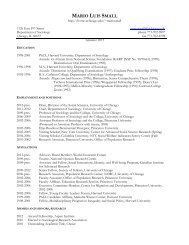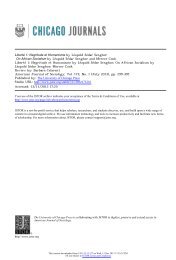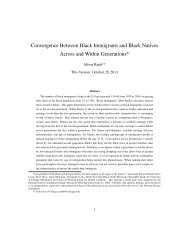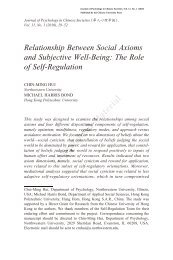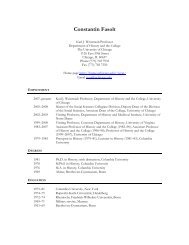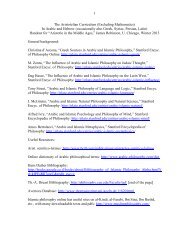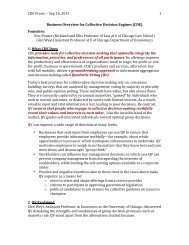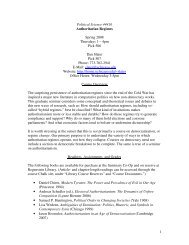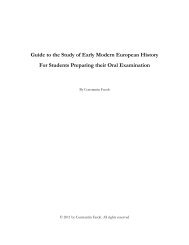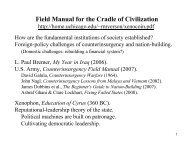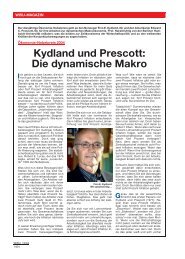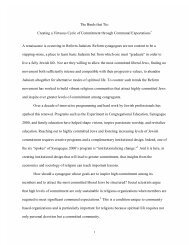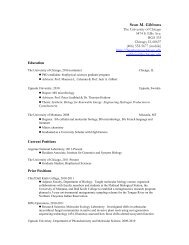Job Market Paper - Personal Web Pages - University of Chicago
Job Market Paper - Personal Web Pages - University of Chicago
Job Market Paper - Personal Web Pages - University of Chicago
You also want an ePaper? Increase the reach of your titles
YUMPU automatically turns print PDFs into web optimized ePapers that Google loves.
Kim: Endogenous Choice <strong>of</strong> a Mediator<br />
vetoing, since the inequality in (T7) is satisfied with both sides equal to zero. Since (6.1)>(6.2),<br />
player 1 <strong>of</strong> a strong type strictly benefits from the veto conditional on player 2 voting for µ 5/17,0 .<br />
Thus, the strong type must always veto the change from µ 1,0 to an ex ante Pareto superior mediator<br />
µ 5/17,0 .<br />
In fact, the only credible vote belief for both players is ¯q·,i = (¯q i,i (s) = 1, ¯q −i,i (w) = 1) for all i.<br />
That is, there exists a credible veto set V i = {s} for all i (and there is no other vote belief satisfying<br />
(ii) <strong>of</strong> Definition 2) that can make the following speech:<br />
“I voted against the alternative because my type is s. If you believe me and I am telling<br />
you the truth, then my pay<strong>of</strong>f in disagreement outcome G µ 1,0<br />
is better than what I get<br />
with the alternative. Moreover, if my type is w, I would get a higher pay<strong>of</strong>f from the<br />
alternative mediator than from G µ 1,0<br />
in which you believe my type is s, and so I would<br />
not want to vote against the alternative. Hence, you should believe me.”<br />
The reasoning behind this example is also straightforward. With the alternative mediator µ 5/17,0 ,<br />
the weak types gain by participating, but strong types lose. By vetoing the alternative, a player<br />
sends a credible signal that he is <strong>of</strong> a strong type. Because a strong type gains relatively more by<br />
disposing <strong>of</strong> mediator µ 1,0 and going to war for sure in the status quo, the other player responds<br />
optimally by going to war less <strong>of</strong>ten after a veto, which in turn strengthens a vetoer’s incentive to<br />
disclose his displeasure with the alternative. A strong type’s signal is credible because a weak type<br />
does better with the alternative mediator.<br />
If a veto resulted in passive inferences in this case, then the alternative µ 5/17,0 still should<br />
not be ratifiable against µ 1,0 . If the inferences are required to satisfy the credibility conditions,<br />
then the alternative is also not unanimously ratified by all types <strong>of</strong> all players, strengthening<br />
the participation constraints even more, by improving the status quo pay<strong>of</strong>fs for the vetoer. In<br />
fact, iteratively performing a pairwise test between µ 1,0 and any other alternative, no alternative<br />
mediator is ratifiable against µ 1,0 . Therefore, by Definition 5, µ 1,0 is threat-secure and is the only<br />
threat-secure mediator among all interim incentive efficient mediators.<br />
Figure 6.3 shows, for the range <strong>of</strong> ¯p(s), that the concept <strong>of</strong> threat-security picks out a unique<br />
mediator from the set <strong>of</strong> interim incentive efficient mediators. Moreover, the threat-secure mediator<br />
is indeed the same as the neutral bargaining solution.<br />
44



